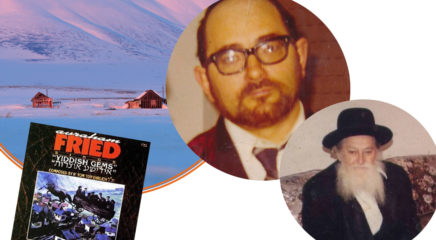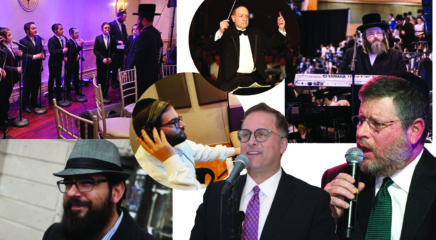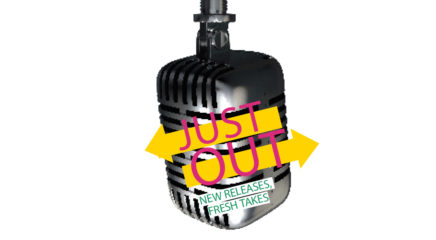I prefer the artists who go for simple, whose singing is less a showcase of their fancy vocals than a focus on the niggun itself
He’s the owner of the popular Blue Melody Group, but ARI BOIANGIU is more than just a guitarist and orchestra leader who’s been playing weddings at night for over two decades. He’s also a Torah teacher by day, as well as an inspirational speaker.
THE BIGGEST CHALLENGE OF MY JOB
A tie between these two: making the customer completely happy and at the same time making sure everyone in the room is happy, and not letting my own or my band’s preferences get in the way of what the simchah needs at that moment. We might love improvising, or branching out from certain songs, but we’re there to entertain the crowd in the way they’ll most enjoy it. When you do this for a living, you need to focus on bringing simchah and emotion to your audience, not your own musical creativity.
A JEWISH MUSIC ARTIST I MOST CONNECT TO
I prefer the artists who go for simple, whose singing is less a showcase of their fancy vocals than a focus on the niggun itself. Yosef Karduner for example, or vintage Rabbis’ Sons and Dveykus material, are easy to connect to because the singing is simple, not a performance meant to display someone’s incredible vocal range.
A SONG THAT TAKES ME TO A DIFFERENT TIME AND PLACE
Ishay Ribo’s “Seder Ha’Avoda.” Epic. It shakes the world and practically leads you to Har Habayis on Yom Kippur, right as the Kohanim are about to bow down.
A TUNE THAT’S A PERFECT MATCH FOR THE WORDS
“Bilvavi Mishkan Evneh.” The words are paced perfectly with the melody. They build up to a crescendo as the tune builds up, and the climax of the song is where you get to the highest level of devotion — “ulekorban akriv lo es nafshi, es nafshi hayechidah.”
A SONG WITH GREAT HARMONY
The older Fried material has nice harmonies, but needs a choir for them. And a lot of Shmueli Ungar’s stuff has beautiful harmonies, like his “Keil Mistater,” from the album Mach A Bracha.
MY MOST MEMORABLE PERFORMANCE
Twenty-five years ago when I was working in Camp Morasha, I was called to play at a wedding on the camp grounds. The chuppah was on the tennis courts, and the dancing was in the lunchroom of the camp’s kollel. The chassan and kallah were both orphans, and the kollel arranged their wedding, everyone contributing their energy to make it special. It was an amazing wedding, overflowing with genuine simchah and giving. I’ve never forgotten it. Covid also brought along a few weddings with that kind of flavor.
AN ALBUM I’D TAKE WITH ON A LONG ROAD TRIP
I’d take MBD’s The English Collection. It was undervalued in its time, but those in the know really appreciate the beauty of the arrangements and the way they express the messages of the songs.
A SONG I’D LOVE TO SEE MAKE A COMEBACK
That’s an easy one. “Didoh Bei.” It was the perfect Hora.
MY FIRST BIG BREAK
Neshama Orchestra, led by Michael Sojcher and Elly Zomick, gave me my first chance to play at a wedding. I was 16, and my mother drove me to the interview with them. Eli Lax started Blue Melody with me. And can I also mention my father, who bought me my first professional guitar?
MY FAVORITE ENGLISH SONG
“This Time,” by MBD, with lyrics by Ken Burgess a”h. It’s very special. You can close your eyes and imagine experiencing the Geulah.
MUSIC THAT HELPS ME UNWIND
Something that’s different, that branches out. Like the music of Aharon and Yonatan Razel. To me, Yonatan’s album Bein Hatzlilim was a watershed moment for Jewish music. Yonatan is classically trained and its style broke a lot of barriers, bringing new creativity, depth and sophistication, with its own kind of emotional impact. Of course, today Ishay Ribo is breaking the mold of what Jewish music “should” sound like, not in a bad way but in a really good way, offering more musical scope for the emotional and spiritual impact, so the creative side can have new experiences in ruchniyus. Although, of course, the traditional material still has its place.
THIS SEASON’S HOTTEST SECOND DANCE SONG
That’s probably “Lechai Olamim” by Matt Dubb with Mordy Shapiro and Benny Friedman. In general, the simpler the song, the more it goes into people’s heads.
SOME UNFORGETTABLE LINES OF ENGLISH LYRICS
“May they know You as I know You, Hashem please hear my plea / Give me children who’ll give nachas, vezakeini…” As a musician, I don’t feel that the music industry is here to give mussar and teach lessons, a singer who has a nice voice is not automatically a gadol, and the whole concept of Jewish celebrities feels off to me. Many singers are wonderful people, yet their role should be viewed as that of a shaliach tzibbur. But this song, these words, are not mussar, but a prayer. And davening and pleading is something that every Yid can do and knows how to do. Words that are the plea of a Jewish heart are just so relatable.
SOME ALL-TIME FAVORITE CHUPPAH SONGS
On the men’s side, “Daled Bavos” is the most popular choice for walking down, whether the chassan is a Lubavitcher or not. I can’t see Ohad’s “Bircas Habanim” ever going out of style, but Moshe Tischler’s “Tefillas Haneiros” and Simcha Leiner’s “Ribono” are a tie for second place after that one.
A SONG WITH GREAT HARMONY
The older Fried material has nice harmonies, but needs a choir for them. And a lot of Shmueli Ungar’s stuff has beautiful harmonies, like his “Keil Mistater,” from the album Mach A Bracha.
(Originally featured in Mishpacha, Issue 946)





